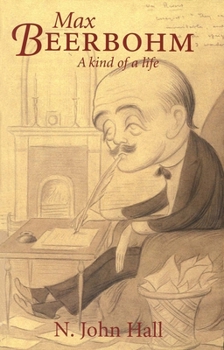Max Beerbohm--A Kind of a Life
Max Beerbohm was widely celebrated as the wittiest mind of his age. And it was a very long age indeed: he became famous in the mid-1890s and remained so until his death in 1956. His wit manifested itself in both prose and caricature, and his writings and drawings are keenly interesting. Max's life, however, was relatively uneventful, and of interest, he said, only to himself. This biography of Beerbohm, the first in forty years, enlivens his story by quoting him whenever possible, and the result--thanks to Max himself--is a scintillating and entertaining book. John Hall moves quickly through Max's history: schoolboy; college undergraduate; London caricaturist, journalist, and critic; Edwardian social butterfly; married man and self-exile to Italy in 1910, where he produced numerous books, essays, and caricatures; and, from 1935 to 1956, occasional BBC radio broadcaster. Hall notes that although all Max's work during his fifteen early years on the London scene concerned contemporary art and life, after his "retirement" in 1910 his writings and drawings harkened back to the late-Victorian/Edwardian era and even to the Pre-Raphaelites; he became, he said, an "interesting link with the past." This book, like Beerbohm's work, highlights his connection with various eminences over three eras: Algernon Swinburne, J.A.M. Whistler, Oscar Wilde, Henry James, George Bernard Shaw, Lytton Strachey, Virginia Woolf, and many others. Written in an idiosyncratic, opinionated, lively, quirky style, it is just the kind of biography of which Max might have (for the most part) approved.
Format:Hardcover
Language:English
ISBN:0300097050
ISBN13:9780300097054
Release Date:October 2002
Publisher:Yale University Press
Length:304 Pages
Weight:1.65 lbs.
Dimensions:1.2" x 6.4" x 9.5"
Customer Reviews
1 rating
A kind of biography
Published by Thriftbooks.com User , 14 years ago
As a writer and caricaturist, Max Beerbohm has unfortunately descended to the level of "cult figure." He is far more an icon of the late Victorian and Edwardian ages, the man who knew seemingly everybody: Wilde, Shaw, Whistler, Wells, Yeats, Arthur Balfour, Beardsley, Henry James, and a host of figures known mainly to scholars of the period. Max (as Maximilians refer to him) deliberately kept his art small and contained -- in its way, a bit like Jane Austen (a writer, ironically, he disliked). However, within those confines he was a master. You read a Beerbohm paragraph and marvel how well it all fits together, as Yeats said, "like the click of a well-made box." His sentences have the chasteness of someone intimately familiar with classical authors, but they don't labor, especially as he grew older. Indeed, you feel yourself in the presence of a very subtle, ironic mind -- in its way, an ultimately moral sensibility -- in the midst of the salons frequented by the great. His drawings not only delight, but instruct. His caricatures of Oscar Wilde trace the decline of that figure. His images of Shaw capture GBS's vitality and self-satisfaction. He has been called by other caricaturists the best since Daumier. Nevertheless, some critics have been fooled by his modesty and his scale. Yet for all of his attempts to downplay his art, Max can't quite hide the facts that he's a prose master and a very acute observer. N. John Hall, a scholar of Trollope and Browning and a zealous Maximilian, has contributed a strange but valuable book to the Beerbohm canon. S. N. Behrman's classic Portrait of Max gave you a sense of what it was like to be in Max's presence. Hall gives you a sense of what it's like to be in the presence of Max's prose and to be moved by it. This isn't a bio in the normal sense. Very little happened to Max. He wasn't a master spy, an explorer, or a Scotland Yard detective. He dined, talked, wrote, drew, and read. The most exciting thing he ever did was pull up stakes in England and move with his wife to Italy, where he died. Unlike certain recent biographers, Hall doesn't try to poke at Beerbohm's inner life. Hall doesn't care whether Max was homosexual, asexual, strongly or weakly heterosexual, a victim of arrested development, for example. In fact, he shows an obvious distaste for such an enterprise, mainly because Beerbohm, although amiable and even lovable, gave away almost nothing of his inner life, except in his prose and drawings. Therefore, Hall focuses on the prose and drawings (he also has put out one of the best and readily-available collections of Beerbohm's caricatures). He concentrates not on Max's psyche, but on why he matters. He makes a wonderful job of it. Indeed, I hazard that he may be *too* sympathetic to Max's art, since at times he sounds as if he's trying through his prose to channel the master. All this means that it's an extremely enjoyable book.





